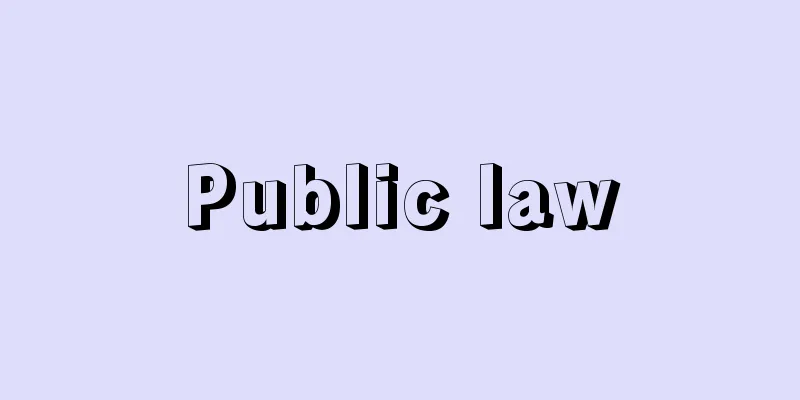Public law

|
In a broad classification of legal systems, public law refers to laws related to the state and public organizations, such as the Constitution, administrative law, criminal law, criminal procedure law, and international public law, and is contrasted with private law, such as civil law, commercial law, and international private law, which apply to legal relations between private individuals. Economic law and labor law are mixed areas of public law and private law in this sense. In a narrower sense, public law refers to laws that are specific to administration among the laws that apply to administrative activities, excluding private law that also applies between private individuals, and is also called administrative law. In terms of positive law, groups of laws such as tax law, land law, environmental law, civil servant law, education law, defense law, and police law are public law, but the distinction between public law and private law is not always clear, and there are various theories. Originally, the distinction between public law and private law was recognized in countries with civil law systems such as Germany and France, and this distinction was important in conjunction with the judicial system in which administrative courts have jurisdiction over the realm of public law and civil courts have jurisdiction over the realm of private law. In Japan, the civil law system was introduced during the period of the Constitution of the Empire of Japan, so this distinction had practical significance, and since administrative courts adjudicate cases separately from private law, the legal principles unique to public law were formed. However, regarding the distinction between public law and private law, there are various conflicting theories, such as the subject theory, which states that all laws related to the state or public corporations are public law, the power theory, which states that laws related to power-submission relationships are public law, and the interest theory, which states that laws related to the public interest are public law, and these theories have been understood differently depending on the era and country, and are not universal and timeless. In contrast, countries with common law systems do not have an administrative judicial system, and the state and public organizations are subject to the same jurisdiction as private individuals in the civil courts, so public law as a legal system unique to the administration did not come into existence. After the Second World War, Japan abolished administrative courts following the Anglo-American model and decided to subject all administrative disputes to civil court trials, so the foundations of public and private law are shaking, but the Administrative Case Litigation Act still provides for appeals as lawsuits against the exercise of public power, and for public law party lawsuits for legal relationships under public law, so it is considered necessary to distinguish between public law and private law in order to define the application of this law. However, it is difficult to distinguish between public law and private law in practice, and there is almost no difference between public law party lawsuits and civil lawsuits, so the distinction between public law and private law has become almost useless today. [Yasuhito Abe] [Reference] |Source: Shogakukan Encyclopedia Nipponica About Encyclopedia Nipponica Information | Legend |
|
広く法体系の分類としては国家・公共団体にかかわる法、すなわち憲法、行政法、刑法、刑事訴訟法、国際公法などを公法といい、民法、商法、国際私法など私人間の法律関係に適用される私法に対比される。経済法や労働法はこの意味での公法と私法との混合領域である。より狭義には、行政活動に適用される法のうち、私人間にも適用される私法を除いた、行政に特殊固有の法を公法といい、これは行政法ともよばれる。実定法上は租税法、土地法、環境法、公務員法、教育法、防衛法、警察法などの法群が公法であるが、公法と私法との区別はかならずしも明確でなく、各種の学説がある。 もともと、公法と私法との区別はドイツ、フランスなど大陸法系の諸国で認められてきたもので、公法の領域については行政裁判所、私法の領域については民事裁判所が管轄権をもつという裁判制度と相まって、この区別は重要であった。日本では大日本帝国憲法時代に大陸法系の制度を導入したので、この区別は実際的意義をもち、また、行政裁判所は私法と離れて裁判するところから、公法独自の法原理が形成されていった。しかし、公法と私法との区別については、国家または公法人に関する法はすべて公法とする主体説、権力服従関係に関する法を公法とする権力説、公益に関する法を公法とする利益説など諸説が対立し、またそれは時代により国により異なって理解されてきており、時代を超越した普遍的なものではなかった。これに反し、英米法系の諸国では行政裁判制度を置かず、国家・公共団体も私人と同じ民事裁判所の管轄に服するので、行政に固有の法体系としての公法は成立しなかった。第二次世界大戦後の日本は英米法系に倣って行政裁判所を廃止し、行政に関する争いはすべて民事裁判所の裁判に服することにしたので、公法と私法の存立基盤は揺らいでいるが、それでも行政事件訴訟法は公権力の行使に関する不服の訴訟として抗告訴訟、公法上の法律関係につき公法上の当事者訴訟の制度を置いているので、この法律の適用関係を画するために公法と私法との区別をする必要があるとされる。しかし、公法と私法との区別は実際上困難であるうえ、公法上の当事者訴訟と民事訴訟との違いはほとんどないことから、今日では公法と私法との区別はほとんど実益がなくなっている。 [阿部泰隆] [参照項目] |出典 小学館 日本大百科全書(ニッポニカ)日本大百科全書(ニッポニカ)について 情報 | 凡例 |
<<: Navigation - kouhou (English spelling)
Recommend
Hokoji Temple
It stands alongside Toyokuni Shrine in Chayamachi,...
Naokata Kusama
Year of death: Tempo 2.2.25 (1831.4.7) Year of bir...
Ramdās (English spelling)
[Born] 1608 [Died] 1681 He was an Indian religious...
Mount Asahi - Asahidake
This mountain range is on the border between Yamag...
Ka-row irregular conjugation - Kagyouhenkakukatsuyo
One of the conjugation forms of verbs. The word fo...
Prims
… [Geography] It is part of the Saar-Nahe mountai...
Near sighted eye
… When accommodation is stopped, the position at ...
Recital - Risaitar (English spelling) recital
Solo concert, solo performance. The word originat...
Honinbo - Honinbo
The name was coined by the Go master Sansha (1558...
Owada Shuchiku - Owada Shuchiku
... On the other hand, initially, travel to the c...
Subculture - Kaibunka
Please see the "Subculture" page. Sourc...
Location Contract - Basyoukeoi
A method of Ezo management used by the Matsumae Do...
da Ponte, L. (English spelling) daPonteL
The opera was first performed in October of that ...
Dekker - Thomas Dekker
English playwright and pamphleteer. Apparently bo...
Nikomedes
...Also, by increasing the manufacturing precisio...









